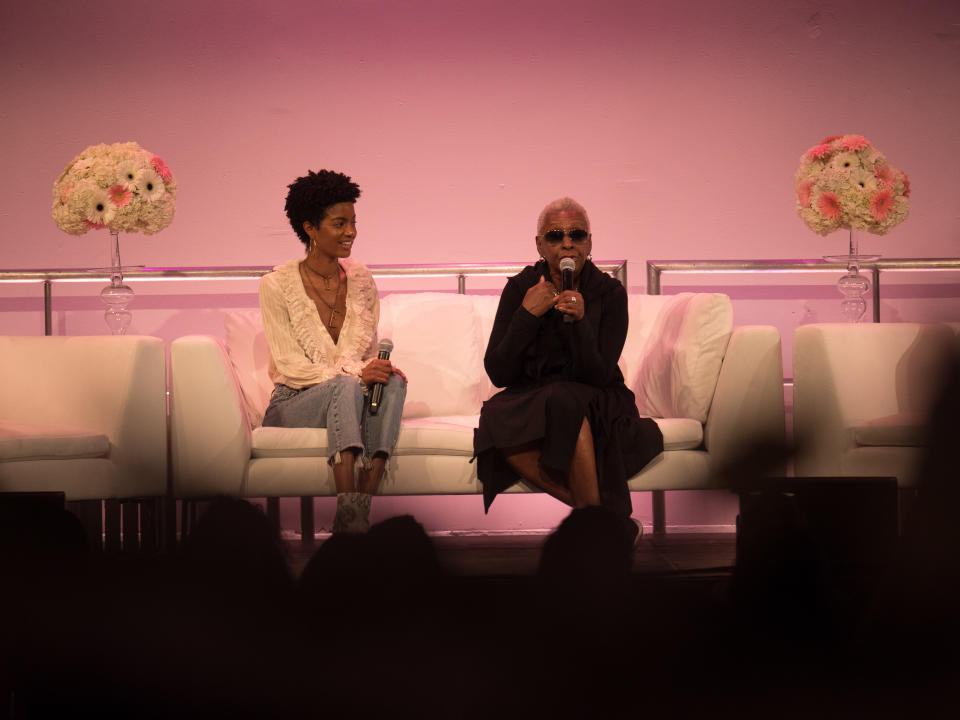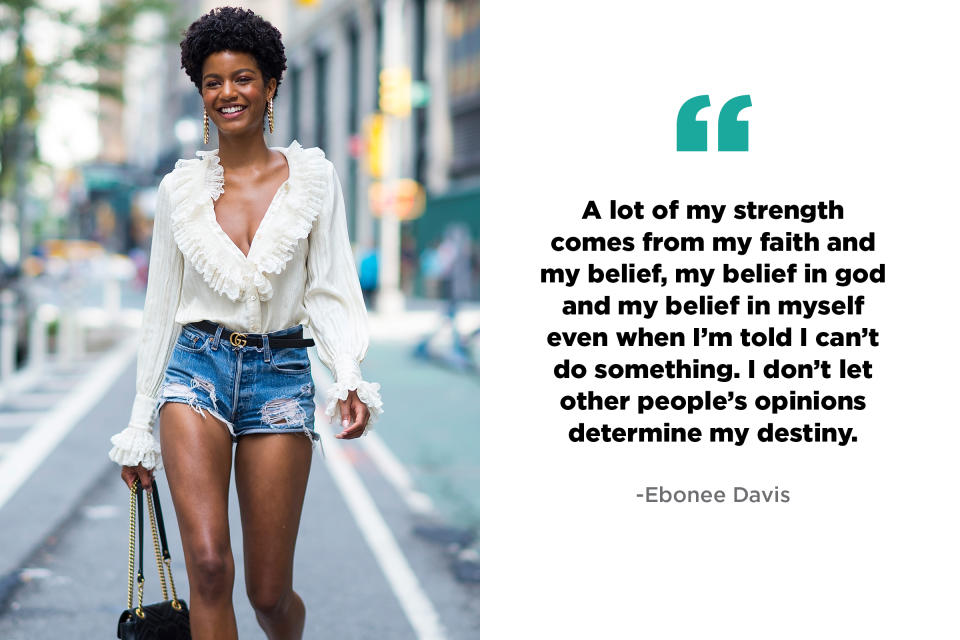Jenna Lyons, EIC Laura Brown, and model Ebonee Davis on inclusivity in fashion and building confidence

On a cool, autumn day in the middle of October, I attended The Other Festival, a two-day women’s only festival that took place at City Point in Brooklyn. The first of its kind and only in its second year, the festival boasted a star-studded lineup of impressive speakers spanning careers in journalism, film, fashion, and more. Among them were former J.Crew president and creative director, Jenna Lyons, InStyle editor-in-chief Laura Brown, and top model and activist, Ebonee Davis.
The panels presented a series of topics, from how to build a brand to writing impactful content and building diversity. The discussion on diversity was led by Davis and Bethann Hardison, two activists and models of different generations, both fighting for the same rights: more diversity on the runway.
Davis has fronted campaigns for Calvin Klein to Adidas Originals, and also presented a TED Talk on diversity in fashion and what she calls “Black Girl Magic.” Her journey has not always been easy. She recalls being told in her early days of modeling that her “rolled-out-of-bed hair wasn’t going to work.” On another occasion, Davis was blatantly told by a model agency that it “already had her look,” signaling that the agency’s staff felt it was enough to have a tiny quota of token black models. Davis wasn’t having it.

She continued to push through the obstacles put in her path, and became a new voice for a generation of young black aspiring models hoping to enter the fashion industry, but it took a lot of inner strength, belief, and determination to get her to where she is now.
Davis shares with Yahoo Lifestyle, “A lot of my strength comes from my faith and my belief. My belief in God and my belief in myself, even when I’m told I can’t do something. I don’t let other people’s opinions determine my destiny. I really believe I am in control of my fate, and if there’s a will, there’s a way. I know it’s cliché, but it’s true.”

Although much of Davis’s activism is focused on racial diversity in fashion, that doesn’t mean plus-size inclusivity doesn’t fall under the same umbrella. “I think it’s a very important part of our industry as well — body diversity,” she says. “I think a lot of people suffer from body insecurity. For me it was my hair and my skin, but for a lot of people, it’s their body. So I think it’s really cool that we have brands like Chromat,” led by designer Becca McCharen-Tran, another speaker at the festival. “[McCharen is] constantly pushing for body diversity on her runways.”
For InStyle editor-in-chief Brown, diversity and inclusivity within fashion isn’t just about reaching a quota, it’s about representing real people, real beauty, and real bodies. “I hate quotas,” she says. “I don’t think like that. When I look at a magazine, I say here’s my friend Gabby Sidibe, here’s Lena Dunham, and here are 5 models we found on the street.” Life isn’t about quotas, so why should fashion be?

This idea resonated with Lyons, who has been relatively out of the spotlight since her departure from J.Crew this spring, but who has always been a champion for diversity in fashion. Lyons has pushed boundaries in the past, having ditched traditional models for her presentations and opting to cast colleagues and friends who represented the type of people she wanted to showcase. In doing so, she hoped it would inspire other women and men to believe they can be models, too, if that’s the career they aspire to have. “I want some little girl who has freckles and a gap tooth and maybe isn’t a size 2 to think: I should go out to an agency because I’m seeing that on the runway and maybe somebody might see that in me,” Lyons shares with Yahoo Lifestyle. “If you don’t see it, you’re never going to go and seek it out.”
But as much as the change needs to happen within the culture of the industry, Lyons also thinks that the problem stems from the rise of social media and what’s considered beautiful on the platform. People are creating “a life that is not necessarily real” and they are posting photos that have been retouched and heavily produced. “There’s a veil of inaccuracy,” says Lyons.
However, Lyons is hopeful about the cultural shift taking place both on the runway and on social media. “Do I think it [diversity in fashion] is here to stay?” she says. “I certainly hope so. Do I think there’s a lot of change in our culture that’s both hopeful and judgmental? Yes.”
Still, there are ways in which one can build confidence and strength in oneself. It also helps to find a supportive community, something Lyons struggled with when she was a young girl. “When I was growing up, I had no place to find people who were like me,” she says. “I had no opportunity to share ideas with people who were like-minded. So you can feel isolated. I think there is nothing more powerful than feeling like you’re not alone, feeling like there’s someone who has your back, feeling like you have a community.”

This community can include friends and colleagues, as well as participating in events like the Other Festival, which brings together strong, intelligent, creative women. It’s a place where women can share ideas, teach one another, and push each other to enact positive change in all industries, whether it’s fashion, beauty, media, or anything else.
Read More from Yahoo Lifestyle:
? The complete Fashion Week trend guide for Spring 2018
? 16 celebrities you probably didn’t know attended historically black colleges
? Shop more than 500 iconic Gianni Versace-era items starting at $140
Follow us on Instagram, Facebook, and Twitter for nonstop inspiration delivered fresh to your feed, every day.
